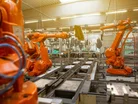RoboSAPIENS Project to Improve Human Trust in Robots

Robo sapiens are robots that perform human-like activities. Some are futuristic and humanoid, as seen in sci-fi hits like ‘Ex Machina’ and ‘Star Wars’, and are brought to reality by modern AI androids. Others, like the robo sapiens typical to supply chain manufacturing, take a more crane-like appearance, automated to repeat precise tasks rather than invite us all into the depths of the uncanny valley.
Regardless of their appearance, it’s rare humans – real or fictional – trust robots, something which is having an impact on supply chain manufacturing.
Surveys like Brooking’s ‘Keeping Workers Safe in the Automation Revolution’ show workers feel unsafe around robots. This is not unwarranted, as a recent BBC analysis of 150 Amazon warehouses shows. Twice as many human injuries were experienced in warehouses with robots, indicating a problem with ensuring worker safety. It's a problem likely to grow as global manufacturing’s investment in robotics increases.
Last year in the US, installations of industrial robots rose by 12%, reaching a staggering 44,303 units. China, which has some of the largest manufacturing operations in the world, plans to majorly ramp up its investment in robotics. According to a report by the Chinese Ministry of Industry and Information Technology (MIIT), China is targeting the mass rollout of humanoid robots by 2025 and advanced levels of the technology by 2027. The International Federation of Robotics also recently published data showing that industrial robot installations in Europe continue to rise.
So, who will rise to address this problem? Enter RoboSAPIENS, a project funded by the European Union and led by leading European university researchers, scientists and technology experts that seeks to address industrial robots. RoboSAPIENS has been created to advance the software adaptations of autonomous robots, ensuring all sectors, including manufacturing, have access to robots with enhanced trustworthiness, efficiency and safety. Improving human trust in robots is key to the goals of the project.
RoboSAPIENS seeks to empower robots with open-ended autonomous software adaptations, allowing them to maintain trustworthy relationships with humans whilst adapting to unforeseen environmental or systematic changes. The project, which seeks to enhance robotic self-adaptation, will run for three years and elaborate on the existing autonomic computing framework for robots, the Monitor-Analyse-Plan-Execute-Knowledge framework known as MAPE-K. Essentially the RoboSAPIENS team will work with current operating frameworks, enhancing safety controls, analysing robot responses and creating adaptations based on systemic and environmental factors.
The RoboSAPIENS project lays out a series of specific goals, that will aim to improve the role and perception of robots across supply chain manufacturing. One of these goals is enhancing robots trustworthiness. This will be accomplished through DL and computational architectures, utilising specific verification techniques and tools. The project also seeks to improve the pre-adaptation and post-adaptation safety of robots through advanced engineering techniques, self-evaluation schemes and trustworthiness checkers.
RoboSAPIENS also wants to develop software that makes robots more capable of responding to unprecedented changes. These can include primarily human interactions along with systemic and environmental changes. All this is known as open-ended self-adaptation. Another goal of the project is to reduce task uncertainty in robotic self-adaptation. The RoboSAPIENS team seek to reduce this through Deep Learning (DL) techniques. Through these techniques, uncertainties in DL models can be addressed, and more reliable adaptations can be created.
“As the EU advances its industrial robotics capabilities, it’s imperative that measures be taken to ensure the safety and trustworthiness of the next generation of robots working alongside humans in a collaborative environment,” says Peter Gorm Larsen, Coordinator of the RoboSAPIENS project and Professor in the Department of Electrical and Computer Engineering at Aarhus University.
“With RoboSAPIENS, we will prepare Europe’s industrial robotics industry for rapid and unforeseen adaptability in system structure and environment, assuring trustworthy collaboration with humans by changing behaviour while maintaining and even enhancing performance and safety.”
The project is already working with manufacturers that use industrial robots, trialling their software with autonomous water vessels and robot cells that disassemble e-waste. As the RoboSapiens project ramps up and robots come to dominate more of the manufacturing process, we look forward to future developments that enhance their efficiency, effectiveness and trustworthiness towards the workforce.
******
Make sure you check out the latest edition of Manufacturing Digital and also sign up to our global conference series - Procurement & Supply Chain 2024 & Sustainability LIVE 2024
Manufacturing Digital is a BizClik brand.
- Schneider Electric to Showcase 2025 Offerings at SPSDigital Factory
- How is ABB Revolutionising Automotive Sustainability?Sustainability & ESG
- Augury: AI-Powered Machine Health and Solving the Skills GapAI & Automation
- Moody's: how Manufacturers can Mitigate Supply Chain RisksProcurement & Supply Chain


